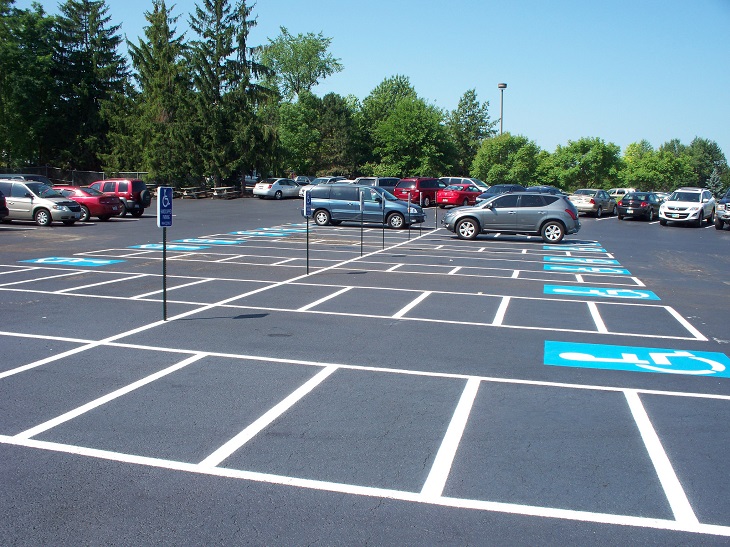Handling the Stigma of Invisible Symptoms When You Have a Disabled Parking Permit

Having a “hidden disability” means that your symptoms are not always overtly visible to others. You might face criticism when people see you using your disabled parking permit. If they can’t see your disability and you don’t require a wheelchair or a cane, some might assume that you don’t really need your handicap parking placard. This stigma means that you might feel judged or you might even face confrontations from individuals who mistakenly feel it’s their job to determine who is worthy of a closer parking place.
People with “hidden disabilities” often have symptoms that aren’t noticeable to others. Conditions that don’t have outward symptoms can include everything from chronic pain and acute osteoporosis to breathing problems and sight difficulties – all of which will qualify someone for a disabled parking permit. For example, individuals who suffer from autoimmune disorders (such as lupus) don’t often experience outwardly noticeable symptoms, but it can still be quite difficult for them to walk far distances. People with degenerative disorders, such as Parkinson’s or multiple sclerosis, often have limited mobility as well. It’s important to note that these medical conditions are every bit as serious and valid as someone who is exhibiting symptoms that are observable. Even if someone “looks healthy,” they might still be suffering from a medical condition and can still benefit greatly from having a disabled parking permit.
If you experience invisible symptoms, you probably already know that there are some people who wish to make judgments about your right to a disabled parking permit. Here are some tactics you can use to handle this stigma.

Ignore people’s judgments
First, it’s important to remember that you don’t have to engage at all with someone who is treating you unfairly just because they don’t think you deserve a handicap parking placard. You are under no obligation to defend or explain yourself. Even if someone is bullying you, you should remain steady in the knowledge that you obtained your disabled parking permit the correct way through your state’s Department of Motor Vehicles (DMV), and from a licensed physician who verified your disability and your need for a handicap parking permit. You have every right to use your handicap placard – your symptoms are credible, even if others can’t see them.
Educate others
If you decide you’d like to explain your situation or the challenges of having a “hidden disability” to someone, it can be helpful to fight the stigma of invisible symptoms. You don’t necessarily have to divulge any of your personal medical information, but you can explain how there are countless conditions where people have symptoms that are not easily observed by others, but that are still as valid as someone who needs a wheelchair or assistance walking. Feel free to list diagnoses to prove your point – asthma, inflammatory bowel disease, heart conditions, etc. are all disabilities that don’t have visible symptoms, but that can be every bit as debilitating to the person experiencing them. It might help to remind some people that folks with disabilities have an even harder time because they are faced with this stigma. Having people judge a disability (or lack of a visible one) can add even more frustration and conflict into a disabled person’s already complicated life. Sharing some of these ideas might be helpful to someone who hasn’t thought through their judgments.
Participate in calm conversations
Open dialogues are always great problem-solvers. Being able to open someone’s eyes to the challenges of “hidden disabilities” can go a long way to chip away at the stigma surrounding invisible symptoms. However, if someone is saying abusive things, raising their voice, or being threatening in any way, feel free to exit the conversation. It’s not your job to placate someone if they’ve decided to be argumentative. If a calm conversation is possible, this will always be your best bet to actually educate someone about “hidden disabilities.” But the moment these interactions turn negative, you’re entitled to politely decline to talk further.

Avoid negative confrontations
If it’s clear the person you’re speaking to isn’t open to hearing your side of things and can’t get past the idea that you don’t deserve your disabled parking permit, it’s probably time to end the conversation. Confrontations will only end poorly – sometimes they can even result in violence. If you can tell the conversation is going nowhere, don’t escalate things by getting defensive or angry. People who are looking for a fight are generally trying to get you riled up. Don’t stoop to this level. Exit any situation where yelling or threat-making is taking place.
Call the authorities if necessary
Don’t forget that it’s totally your right to call the authorities if you feel like you’re in a dangerous situation. If the interaction has escalated in any way, and you don’t feel safe, call your local police department or 911 if you need help. Police can help defuse an unsafe situation, and they’re great to have on hand in case you need to make a formal complaint or press charges. Police are also able to tell the other party that you have obtained your disabled parking permit legally. Don’t be afraid to ask for help if you need it – it’s better to be safe than sorry.
Dealing with a “hidden disability” can be difficult enough already, without the additional frustration of someone challenging your right to a disabled parking permit. Keep in mind that your invisible symptoms are real and valid and that anyone questioning you is likely just uninformed. Hopefully, the people who are willing to have level-headed discourse with you can work to end the stigma around invisible symptoms.